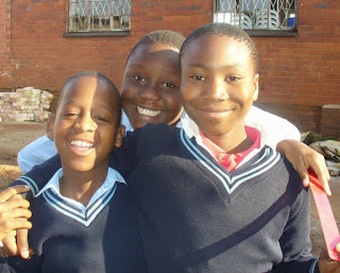 December 1 is World AIDS Day, a time to remember the 34 million people in the world today living with HIV. Half a million have died in the US alone. More than two thirds of those living with HIV are in sub-Saharan Africa where I have lived for many years. For every one person with the virus in the blood steam, weakening the immune system, countless others are affected—parents, children, friends, employers, employees, whole communities loosing economic power as wage earners become too ill to work. Anti-retroviral drugs have greatly extended the lives and health of people living with HIV, but the virus still presents huge challenges.
1 Comment
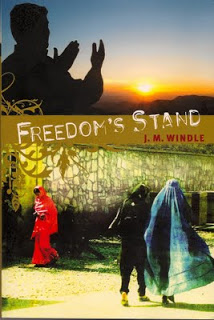 I have been surveying readers to find out what they would like more of on this blog. This is for all those who like book reviews and for those who want to hear more spiritual thoughts relevant to travel, justice, etc. It also falls under “other people’s ministries with children at risk” because, although she is fictional, Jeanette Windle’s character, Amy, in Freedom's Stand works with women who have been imprisoned in Afghanistan and their children. (That is, children who have been growing up in prison with their mothers. You can’t get more at-risk than that.) Some of the “women” are hardly more than children themselves—children running away from forced marriages to older men who abused them. 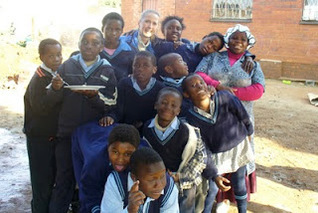 I learned a new way to eat marshmallows my last day at the Tembisa Baptist Church. Put it in your mouth; chew it; spit it back in your hand; stir to a paste with your finger and lick. Fully half the children ate their marshmallows this way. To make it last? my daughter suggests. Maybe. But I think next time I bring sweets it will be hard candy. (You will appreciate that this blog does not include a photograph for your edification.) 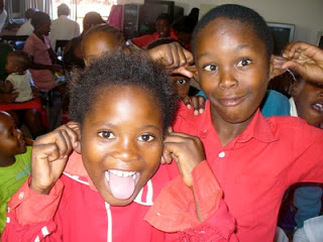 As you have probably figured out by now, things in Africa don’t always go according to plan. As they say, the three most important qualities in a missionary after faith in God are flexibility, flexibility and flexibility. Wednesday was my last day at Arebaokeng. “When are you going to bring the children some sweets?” I was asked. My last day seemed like a good time. 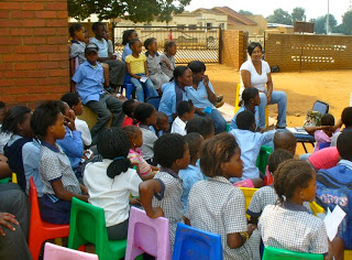 This time the chaos was at Tembisa Baptist Church, the second location I visit. I tried the dramas. Without a translator it never would have worked. It was hard enough to make the children understand that I didn’t want a speech but a drama, and that I didn't care what language they used. No one got the idea of showing the plans needed to reach the goal of becoming a nurse or teacher or police. I had to talk about that after the presentations. 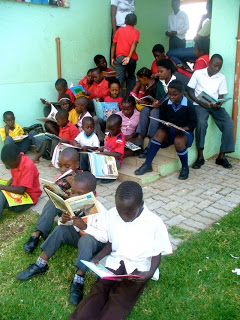 Today for Tomorrow lesson one was about journeys—to places like Mpumulunga or Johannesburg or the one each of us makes through life. Lesson two is about dreams of where we would like to go on our life journey. I took a stack of library books about places one might visit—Namibia, Swaziland, the Drakensburg Mountains of South Africa—and another stack about jobs and professions. It does this librarian’s heart good to see the children sitting on the steps devouring books. One girl held an armload, not wanting to give any to one of the younger boys. “He can’t read yet.” 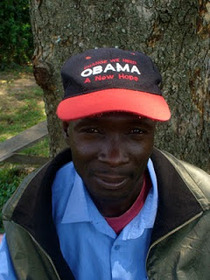 Western Kenya is the home of President Obama's father. He is very popular there. Western Kenya is the home of President Obama's father. He is very popular there. Kisumu, Kenya, looks like a peaceful city. It hugs the shore of Lake Victoria, the largest lake in Africa. Sometimes called “the eye of the rhino,” the lake sits on a plateau in a split of the Great Rift Valley between Kenya, Uganda, and Tanzania. When I visited in August, I saw no signs of the violence that swept the city following the December 2007 elections when the Luo candidate for president lost under questionable conditions to the Kikuyu candidate from Nairobi. But the pain has left deep scars. Ethnic violence wasn’t confined to the city. I came to the village of Awasi, an hour east, to teach a workshop on writing for children affected by the violence. Every morning empty trucks rattle over the dirt road out of town. They return each afternoon, loaded with cane from local farmers. Children chase the trucks, hoping <!--more-->for something to fall off. It usually does. Life goes on despite the horrors of the past. 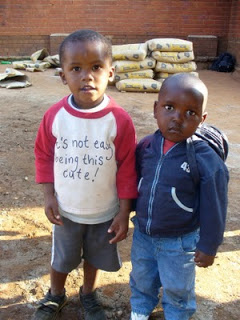 My passion is for school-aged children, but who can resist the little ones with their wide-eyed curiosity and readiness for books and learning? When I arrived at Tembisa Baptist Church on Wednesday, they lay on the floor in tightly packed rows looking like nothing so much as giant fleece-wrapped enchiladas. Each child was dressed in multiple layers against the Johannesburg winter and rolled in a brightly colored blanket. The floor beneath them was spread with crumbling mats of yellowed foam rubber covered with a blanket of doubtful hygiene. Here and there a canvas shoe stuck out from a bundle. A few heads raised and bright eyes stared at me. Most slept on, oblivious to the chatter of the aids who looked after them. Slowly more and more woke from their nap, and I invited them for a story. How I wish that someone would read to them every day! 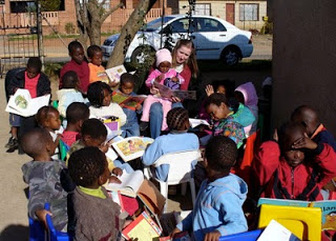 I started blogging in 2006 to have somewhere to share my experiences reading with orphans and vulnerable children in Tembisa Township. We were living in near-by Kempton Park at the time. (To read some of those early blogs see Lindiwe's Friends.) We have since moved back to the United States. I return to South Africa once or twice a year and always make it a point to get to Tembisa. This has been one of those weeks, wedged between our retreat in George and teaching next week in Kenya. |
AuthorLeAnne Hardy has lived in six countries on four continents. Her books come out of her cross-cultural experiences and her passion to use story to convey spiritual truths in a form that will permeate lives. Add http://www.leannehardy.net/1/feed to your RSS feed.
To receive an e-mail when I post a new blog, please subscribe.
Categories
All
Archives
November 2022
|
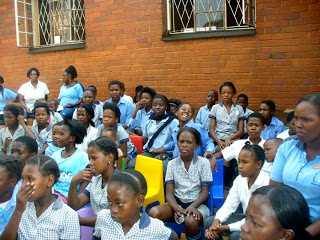
 RSS Feed
RSS Feed